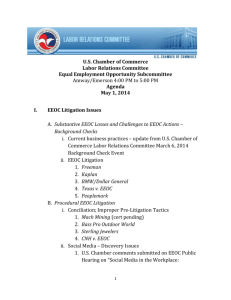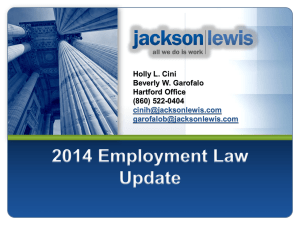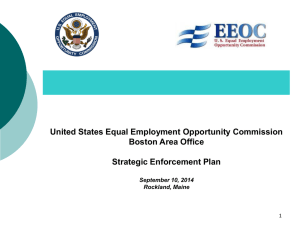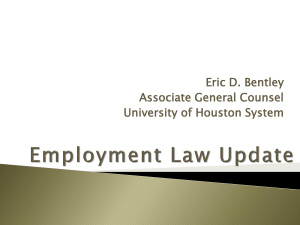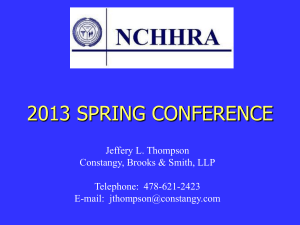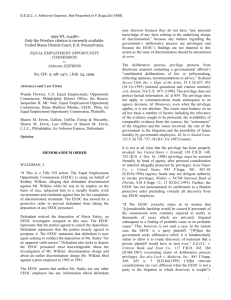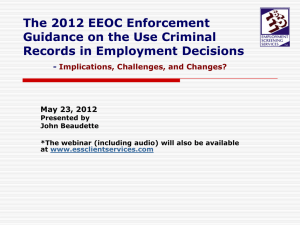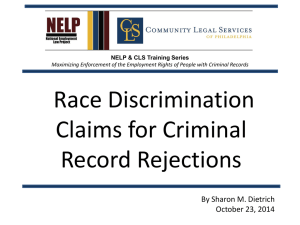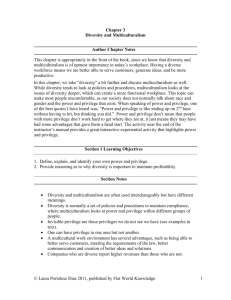EEOC Initiatives and Trends - National Employment Law Council
advertisement
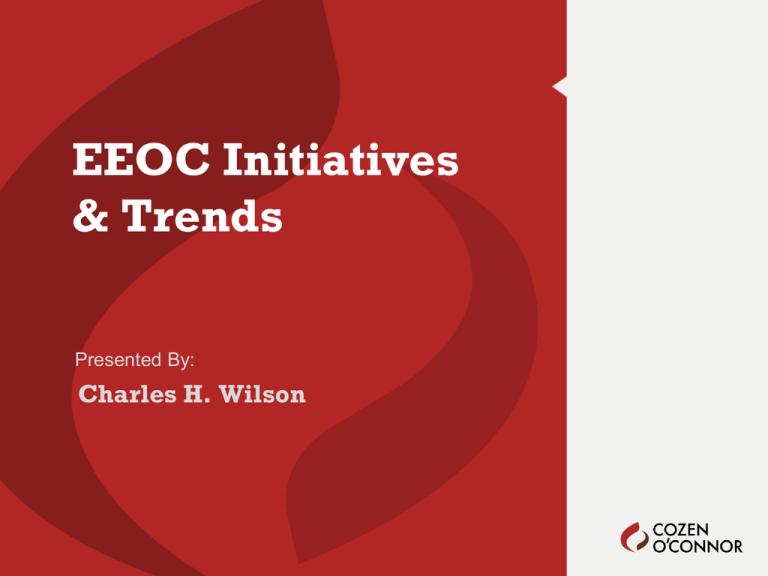
EEOC Initiatives & Trends Presented By: Charles H. Wilson Agenda 1. Recent Charge Activity and Statistics 2. EEOC’s Strategic Enforcement Plan 3. Noteworthy EEOC Cases Energized EEOC Number of Charges 120,000 100,000 80,000 60,000 Charges 40,000 20,000 0 FY 2006 FY 2007 FY 2008 FY 2009 FY 2011 FY 2012 Energized EEOC • Backlog reduced by nearly 8,000 • Resolved 111,139 FY 2012 charges • Larger recoveries Energized EEOC Systemic Investigations 2012 2011 Completed 240 235 Settlements 65 35 Reasonable Cause 94 96 Lawsuits 12 23 Money Recovered $36.2M $9.6M EEOC Litigation • Texas is “top 5” state for EEOC suits. • Texas received the most charges (9,952 – 10% of total charges) • 44% of 2012 EEOC cases were class or mass actions. • Most were ADA and Title VII cases EEOC Litigation Claim Lawsuits Disability Discrimination and Harassment 45 Retaliation 26 Sexual Harassment 23 Race Discrimination and Harassment 14 Age Discrimination 12 Pregnancy Discrimination 11 Religious Discrimination and Harassment 11 National Origin and Harassment 7 EEOC’s Strategic Enforcement Plan Strategic Enforcement Plan • Approved on December 17, 2012 • Road Map of EEOC’s Focus During Next Three Years • Requires District & Field Office SEPs by March 29, 2013 Strategic Enforcement Plan 1. 2. 3. 4. 5. 6. Hiring and Recruitment Discrimination Emerging Theories Retaliatory Practices or Policies Equal Pay Act Claims Systemic Harassment Human Trafficking Strategic Enforcement Plan Top Three Areas Hiring Discrimination Disability Discrimination Disparate Impact Age Discrimination Hiring Discrimination EEOC will target screening tools that disproportionately impact racial, ethnic and religious groups, older workers, women and disabled applicants. Criminal Background Checks Pre-employment tests Drug tests Hiring Discrimination Criminal Background Checks Convictions must be job related and consistent with business necessity Related to the job Opportunity to explain Hiring Discrimination Arrests Can’t be used alone Underlying conduct can be used Misconduct must be job related and consistent with job necessity ADA (ADAA) Inflexible leave policies Direct threat screening The interactive process Age Discrimination Disparate Impact Claims EEOC will focus on the “Reasonable Factors Other Than Age” defense Age Discrimination “Reasonable Factors Other Than Age” (i) (ii) (iii) (iv) (v) Policy or decision related to the employer’s business Employer defined and applied factor accurately and fairly Subjective assessments are limited Employer assessed the adverse impact Extent of harm Noteworthy EEOC Cases Inflexible Leave Policy EEOC v. Insterstate Distributor Co. (D. Co., Nov. 2012) Leave policy that automatically terminated employees after 12 weeks and required return to work without restrictions. $5M Settlement Inflexible Leave Policy EEOC v. Verizon Communications (Dist. Md. 2011) “No fault” attendance policy imposing discipline for absences. $20M Settlement Background Checks EEOC v. Pepsi Beverages (2012) Policy excluding African American applicants based on arrests or minor convictions without demonstrated jobrelatedness or necessity $3.13M Settlement Prohibited Inquiries United States EEOC v. Dillard's Inc. (S.D. Cal. Feb. 9, 2012) Attendance policy requiring employee to disclose nature of absence and condition treated violated ADA. $2M Settlement Prohibited Inquiries EEOC v. Dura Automotive (M.D. Ten. 2012) Policy that screened out employees based on positive illegal and legal drug tests. $750K Settlement Reasonable Accommodation EEOC v. United Airlines, Inc., (7th Cir. Ill. 2012) Reassignment preference should be given to minimally qualified disabled person over non-disabled employee. Interactive Process EEOC v. Western Trading (D. Col. 2012) Overkill in requesting information is not good faith interaction for reasonable accommodation purposes Obesity EEOC v. Res. for Human Dev., Inc., (E.D. La. 2011) Obesity, and associated heart problems and diabetes are disabilities without proof of underlying physiological limitations. Retaliatory Policies EEOC v. Cognis Corp., (C.D. Ill. Dec. 12, 2011) Terminating employee for revoking Last Chance Agreement that restricted rights is retaliatory, and Last Chance Agreement was retaliatory policy. Retaliatory Policies EEOC v. Cognis Corp., (C.D. Ill. May 23, 2012) Employer’s summary judgment motion denied because employer anticipated protected activity when it offered Last Chance Agreement. Contact Information Charles H. Wilson cwilson@cozen.com 713.750.3117
